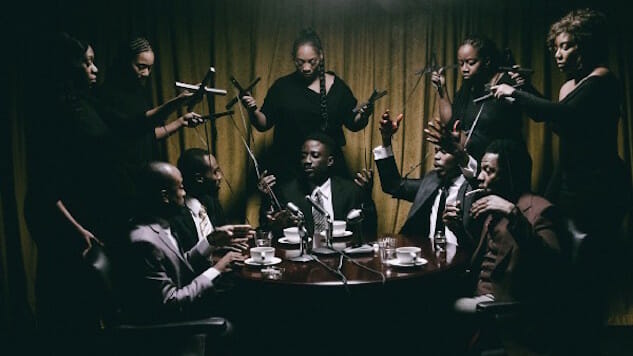Random Acts of Flyness Is Here to Redefine Late Night, and It’s Not F—king Around
Photo: HBO TV Reviews Random Acts of Flyness
Variety shows are an underappreciated art form, either couched too heavily in nostalgia to remain relevant or dubbed too experimental for mainstream audiences and hidden away somewhere weirdness can be tolerated, like Eric Andre’s oasis on Adult Swim.
Thankfully, HBO is looking to shake things up, and Random Acts of Flyness, the brainchild of writer/director/executive producer Terence Nance, is not fucking around. Its indictments and celebrations are fierce, specific, and thoroughly engrossing—and I only got to watch the first entry in the six-episode season.
Kicking off with “What Are Your Thoughts On Raising Free Black Children?” Random Acts of Flyness soars with all the vitality that Vine, Twitter, and YouTube have housed as disruptive, ostensibly egalitarian alternatives to the mainstream film and TV industries. Opening with vertical cellphone video of Nance himself being stopped by the police, and incorporating a multimedia slew of hyper-stylized short meditations on a theme, the show gives you artistic variety like it’s afraid it won’t get a second chance.
There’s a black-and-white multi-speed short film, documentary footage of police brutality, some terrifying cable-access fuzz, an impressively metatextual pharmaceutical commercial that meets abstract animation head-on, and stop-motion dating experiences grown out of a talk show. If you think that sounds like a lot, I didn’t even get to everything in the first half-hour episode. With sparing use of Mr. Show-like throughlines used to transition between segments, there’s a little stability, but mostly Random Acts trusts you to just be cool with it. That’s great for those ready to hop on board from the start, but for those a little more tentative, the guide to understanding it all comes early.
It comes in the form of a segment hosted by a sing-song grim reaper (the captivating Tonya Pinkins) that seems, as her deadpan matter-of-factness gives way to George Zimmerman-damning anger and utter despair, like the embodiment of both millennial depression memes and our society’s callousness with black lives. The result is a Don Hertzfeldt-like obsession with unveiling pain through silliness, cutting so rapidly between the two—either in the tone of the script, the sound, or the images themselves—that the humorous defense mechanism’s pumping hydraulics become visible. We begin moving on its wavelength, the constant need to code-switch reflected in the rapid tonal change like a two-page flipbook. Key and Peele and Sorry to Bother You recently played in a similar space, but without the Michel Gondry-like devotion to images.
This commitment to speed and idiosyncrasy carries over to the aforementioned shifts in the style of the various segments. (It feels wrong to call them “sketches.”) Although they all share a theme (“random” is perhaps too loose a term to define these acts of flyness), the ways they deliver are as varied as a boxer looking for weaknesses in his opponent’s defenses. If this doesn’t hit you, does this? If this doesn’t fully connect—you still think this is only a joke—let’s move to a different approach. “You have what it takes to sober” a group drunk on whiteness, Michael Potts tells an actor whose cameo is too good to spoil here. And if he doesn’t, Nance has something else up his sleeve that will.
That’s not to say the series harps on too long on a topic. As the methodology shifts, so, too, do the nuances of Nance’s interests. When Random Acts slows down, it’s to attract a new kind of attention—say, to bisexual, non-binary black people. If speed must disrupt the status quo, deliberation must build a new one. And yes, they can still have punch lines. Things can be important and funny, though lots of modern comedy seems to resist that.
Nance is savvy enough to inflect even his most dire messages with gallows humor, which only makes his points more salient. That dual dedication to the humor and the message insures the show, with its pointed variety, never feels like it’s coming apart, but instead like it’s building something exciting with its components. And if I see anybody say that a late-night variety show is brave or progressive after this amalgamation of topics, styles, music, and humor airs, well, it’ll be just like having more late-night hosts named “Jimmy” than those that aren’t white.
Random Acts of Flyness premieres Friday, August 3 at midnight on HBO.
Jacob Oller is a writer and film critic whose writing has appeared in The Guardian, Playboy, Roger Ebert, Film School Rejects, Chicagoist, Vague Visages, and other publications. He lives in Chicago, plays Dungeons and Dragons, and struggles not to kill his two cats daily. You can follow him on Twitter here: @jacoboller.